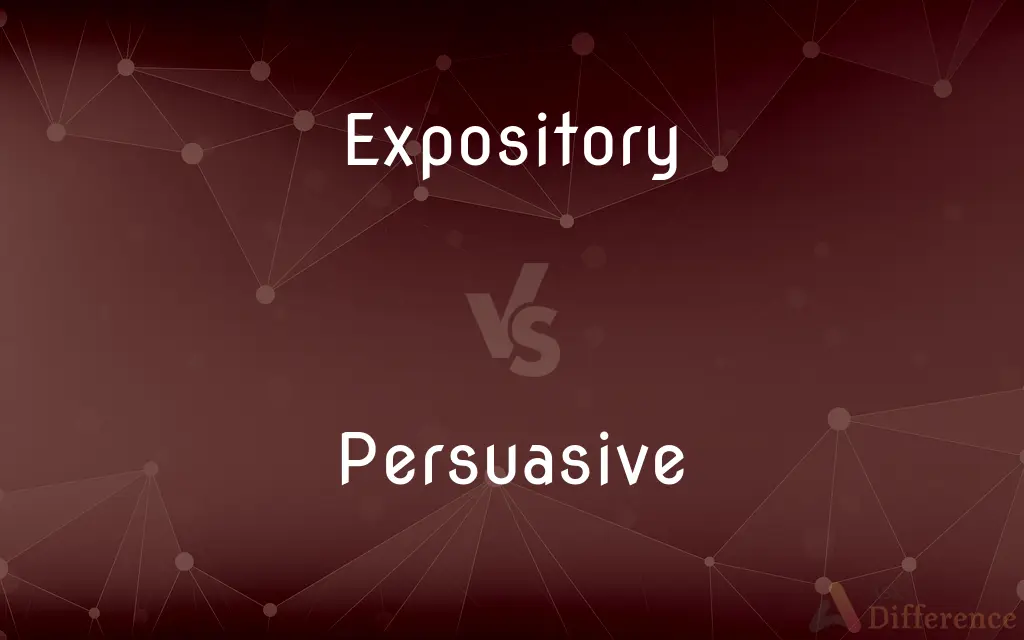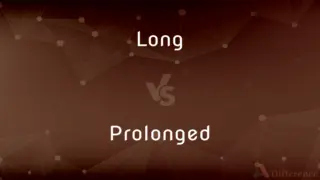Expository vs. Persuasive — What's the Difference?
By Tayyaba Rehman — Updated on September 28, 2023
Expository writing explains or describes a topic, while persuasive writing aims to convince readers to adopt a certain viewpoint or take a specific action.

Difference Between Expository and Persuasive
Table of Contents
ADVERTISEMENT
Key Differences
Expository writing serves to explain, elucidate, or expound upon a subject. It’s a method of presenting information in a straightforward manner, often devoid of personal bias. In contrast, persuasive writing has a clear objective: to persuade the reader to accept the author's point of view or to take a particular action. This type of writing often uses emotional appeals, rhetorical questions, and strong evidence to achieve its goal.
When using an expository approach, the writer often relies on facts, statistics, examples, and logical reasoning. It’s all about delivering clear and concise information about a specific topic. On the other hand, persuasive writing goes beyond just presenting facts; it delves into the realm of persuasion and influence. The goal isn't merely to inform but to change minds and inspire action.
For instance, an expository essay on climate change might explain the science behind greenhouse gases, the history of global temperature changes, and the potential future impacts. Meanwhile, a persuasive essay on the same topic might argue for immediate action to reduce carbon emissions, appealing to readers' emotions and moral obligations to protect the environment.
In essence, while both expository and persuasive writings convey information, their purposes differ significantly: one seeks to inform and educate, the other to convince and actuate.
Comparison Chart
Primary Purpose
Inform and explain
Convince or persuade
ADVERTISEMENT
Uses of Evidence
Facts, examples, logical reasoning
Emotional appeals, rhetorical questions, evidence
Tone
Neutral and objective
Assertive and influential
Audience Engagement
Engages with information
Engages emotionally and intellectually
Common Forms
Textbooks, how-to articles, recipes
Advertisements, opinion pieces, speeches
Compare with Definitions
Expository
Serving to expound or explain
The expository essay clarified the complex concept.
Persuasive
Intending to convince or influence
The persuasive essay argued for stricter gun control.
Expository
Descriptive in nature
The expository writing painted a detailed picture of the event.
Persuasive
Guided by a clear objective or stance
The persuasive article advocated for renewable energy sources.
Expository
Based on facts and logic
The expository report relied on data and research.
Persuasive
Relying on emotional or logical appeals
Her persuasive speech moved the audience to tears.
Expository
Informative and straightforward
The expository guide offered step-by-step instructions.
Persuasive
Effective in swaying opinions
His persuasive arguments won the debate.
Expository
Devoid of personal bias
The expository article provided a balanced overview.
Persuasive
Tending or having the power to persuade
A persuasive argument.
Expository
A setting forth of meaning or intent.
Persuasive
Able to persuade; convincing.
Expository
A statement or rhetorical discourse intended to give information about or an explanation of difficult material.
Persuasive
That which persuades; incitement.
Expository
The art or technique of composing such discourses.
Persuasive
Tending to persuade; having the power of persuading; as, persuasive eloquence.
Expository
The first part of a composition in sonata form that introduces the themes.
Persuasive
That which persuades; an inducement; an incitement; an exhortation.
Expository
The opening section of a fugue.
Persuasive
Tending or intended or having the power to induce action or belief;
Persuasive eloquence
A most persuasive speaker
Expository
The part of a play that provides the background information needed to understand the characters and the action.
Persuasive
Capable of convincing;
A persuasive argument
The evidence is persuasive but not conclusive
Expository
An act or example of exposing.
Persuasive
Seeking to bring about action
The persuasive advertisement prompted many to buy the product.
Expository
A public exhibition or show, as of artistic or industrial developments.
Expository
Serving to explain, explicate, or elucidate; expositive; of or relating to exposition.
Practicing expository writing will teach you to explain complex concepts clearly.
Expository
Pertaining to, or containing, exposition; serving to explain; explanatory; illustrative; exegetical.
A glossary or expository index to the poetical writers.
Expository
Serving to expound or set fourth;
Clean expository writing
Common Curiosities
Is expository writing only found in educational materials?
No, expository writing can be found in a variety of sources, including news articles, guides, and manuals.
Can persuasive writing use facts and logic?
Yes, persuasive writing often uses facts and logical reasoning alongside emotional appeals to strengthen its argument.
Are expository writings devoid of opinions?
Typically, expository writing aims to be objective and sticks to facts, but it can occasionally include the author's perspective.
Can a piece of writing be both expository and persuasive?
While each has distinct characteristics, a piece of writing can blend both styles, especially when informing about a topic and then advocating for a particular stance on it.
What's the main goal of persuasive texts?
The primary goal is to persuade the reader to accept a particular viewpoint or take specific action.
Share Your Discovery

Previous Comparison
Shank vs. Weapon
Next Comparison
Long vs. ProlongedAuthor Spotlight
Written by
Tayyaba RehmanTayyaba Rehman is a distinguished writer, currently serving as a primary contributor to askdifference.com. As a researcher in semantics and etymology, Tayyaba's passion for the complexity of languages and their distinctions has found a perfect home on the platform. Tayyaba delves into the intricacies of language, distinguishing between commonly confused words and phrases, thereby providing clarity for readers worldwide.















































